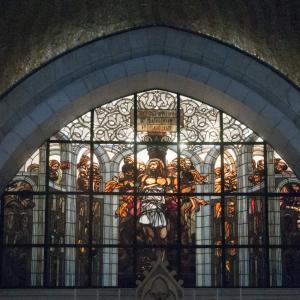Richard Williams is a second-year Honors Scholar MDiv candidate at Candler School of Theology at Emory University. He is also the Minister to Men at Ray of Hope Christian Church in Decatur, Ga. You can find him on Facebook here.
Posts By This Author
A Business Built on Immigrant Anguish
The private prison industry is making billions off of detention centers.
AT 146 CCA ROAD in Lumpkin, Ga., sits the Stewart Detention Center, one of the nation’s largest immigrant holding facilities. It’s also a multimillion-dollar revenue-generating business. The nearly 2,000-bed facility, originally built as a medium-security prison, is owned and operated by CoreCivic (formerly known as the Corrections Corporation of America), the second largest private prison firm in the United States.
Private detention centers, such as Stewart, are major sources of revenue for the private prison industry. CoreCivic is currently trading on the New York Stock Exchange with market capitalization of more than $2.36 billion. The private corrections industry, according to a 2017 Mother Jones article, has received endorsements from then-Attorney General Jeff Sessions and President Donald Trump. The industry’s stocks soared after the president’s executive order to expand the purview of Immigration and Customs Enforcement. With billions in revenue being generated and a government not relenting from its war against undocumented immigrants, private detention centers such as Stewart seem to be here for the long haul.
Stewart is plagued with “chronic shortages,” especially in its medical facility. There are reports of drug smuggling, suicides, and mixing asylum seekers with convicted criminals. Between 2007 and 2012, only 6 percent of detainees at Stewart received legal counsel during their immigration process; only 4 percent were granted asylum. Most undocumented immigrants at Stewart will spend their only time in the U.S. locked up with hardened criminals, subjected to inhumane treatment.
Jesus Is Not Enough
Why Christian Teaching Must Also Consider the Current State of the Church
In my experience, seminaries have perpetuated the notion that Jesus can be molded into the salvific order of the day. While the debate regarding Jesus, his nature, his relationship to the Creator have been the source of debate for millennia, we neglect to account for the debate’s effect on believers. For some, Jesus is an activist intentionally resisting empire. To others, he is ethereal and the God of a few. Others see Christ as the leader of a militant, anti-establishment sect. And to a select few, Jesus is simply “their homeboy”.
How Jesus Experienced Police Brutality

Image via Felix Lipov/Shutterstock
Among the victims of police brutality was none other than Christ himself. While this notion conjures up mixed emotions — including unbearable sadness — we should also take heart. Jesus experienced and overcame police brutality — so can innocent, powerless black women and men. To do so, churches with those most affected by police violence in attendance must cultivate a liberating praxis of anti-oppression retaliation, which includes teaching the characteristics of Christ’s response to law enforcement victimization. The writings of the great theologian James Cone, and others after him allowed us to rip the misguided veil of blasphemy and usher black people into a newfound solidarity with Jesus of Nazareth.
Liberating Theology From Its Ivory Tower
For the brilliant theologians who teach and research at seminaries or divinity schools, part of their work is training the next generation of future pastors for church leadership. Catholic and many Protestant church leaders have received a thorough theological education (though not all). They possess Masters and Doctoral degrees that solidify their ability to grasp the tenets of theology. But for those theologians interested in changing the world for the better, they must offer work that is easily understood by the masses, especially the marginalized population they are seeking to assist.
‘The Mis-Education of the Negro Seminarian’
For seminary administrations and faculty to operate with a business-as-usual approach after these experiences unflatteringly mirrors the indifference of U.S. society at large. Seminary indifference testifies not only to a lack of concern for human life — it also relays a message of indifference to the vocation of the very students they agreed to help upon admission.



